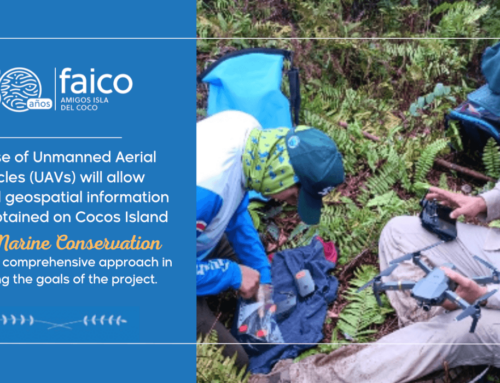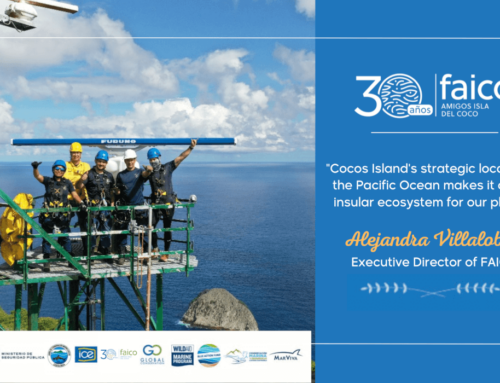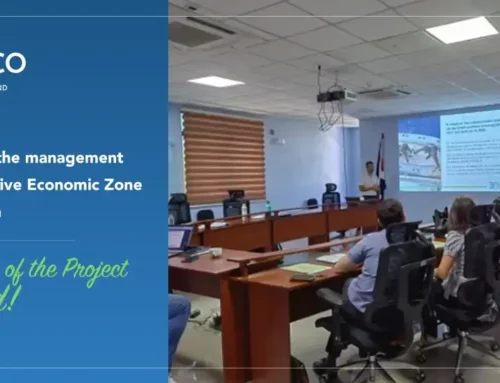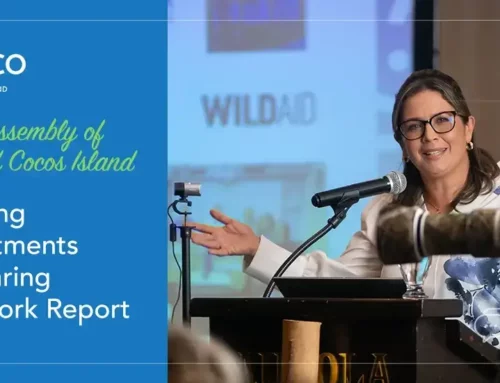- A nursery for Kemp´s ridley turtles in Punta Mala and species from Cocos Island will benefit from the partnership.
- The Partnership for the Education and Conservation of Marine Resources becomes the first public-private initiative framed to strengthen the blue economy model.
- The initiative is led by the Department of Citizen Participation and Governance of SINAC, EPA Hardware Store, and ALIARSE, and it has the support of the Friends of Cocos Island Foundation (Faico) and the German Cooperation Agency (GIZ).
Playa Hermosa, September 20, 2019.
This morning, the Ministry of Environment and Energy (MINAE) through the National System of Conservation Areas (SINAC) unveils the first public-private partnership for the Education and Conservation of Marine Resources, aimed at strengthening the blue economy model.
As explained by the Minister of Environment and Energy, Carlos Manuel Rodríguez: “Thanks to the cooperation between public, private, and civil society sectors, the partnership will work to strengthen initiatives for environmental education, conservation, and protection of marine resources in Cocos Island National Park and the Playa Hermosa-Punta Mala National Wildlife Refuge (RNVS).”
“As a strategy to strengthen existing marine environmental education initiatives in the Pacific area, we will focus on supporting the Marine Environmental Education Strategy for Cocos Island National Park, specifically environmental education strategies aimed at the coastal areas of Quepos, Puntarenas, and Golfito. Likewise, the #MiIsladelCoco campaign will be strengthened, taking it to rural communities and to the Greater Metropolitan Area. This virtual reality campaign allows citizens to get closer to Cocos Island.”
Within the framework of this partnership, a virtual reality campaign will also be developed to present the importance of the Playa Hermosa-Punta Mala National Wildlife Refuge and the role it plays in the preservation of the Kemp´s ridley (Lepidochelys olivacea) through the protection of the beach as a spawning area.
This is the first public-private initiative led by the Department of Citizen Participation and Governance of SINAC, EPA Hardware Store, and ALIARSE, and it has the support of the Friends of Cocos Island Foundation (Faico) and the German Cooperation Agency (GIZ). “It is an innovative initiative promoted within the framework for developing financing mechanisms for environmental sustainability, which implies sharing, in a tripartite way, the responsibilities on biodiversity conservation and ecosystem services among the government sector, the private sector, and civil society. Likewise, it is the window of opportunity to generate experience and replicate this mechanism in other protected wildlife areas, so that stakeholders join to strengthen shared conservation management,” said Grettel Vega Arce, Executive Director of SINAC.
“Our objective is to promote and strengthen public-private cooperation on strategic issues for the development of the country. This is why we focus our efforts on promoting tools that foster innovative mechanisms to achieve the objectives of the 2030 agenda,” said Jorge Nowalski, President of ALIARSE.
“This partnership is of utmost importance to EPA as it aligns with one of our core actions, which is the preservation of the habitat through environmental education. On our side, we activated our social action program “Ayudar es Sencillo” (Helping is Easy), through which customers can make voluntary contributions when they pay for their purchases.
For EPA, this partnership will fulfill a double purpose, since in addition to providing resources for the education and preservation of marine resources in Cocos Island and Playa Hermosa-Punta Mala, they will be training their collaborators, who in turn will be able to transmit their acquired environmental education knowledge to all their customers,” said Andrea Aguilar, Head of Community Initiative.
On the other hand, “For 25 years, Faico has been a strategic ally for the Cocos Marine Conservation Area (ACMC) in the execution of projects. This campaign represents an opportunity for SINAC, private companies, and partner organizations to promote a favorable impact on key stakeholders in the conservation of natural resources, by raising awareness, sensitizing, and using virtual tools, including proposals for the implementation for development of good practices with a comprehensive vision, which is reflected in the Environmental Education Plan that we provide today to the ACMC,” said Alejandra Villalobos, Executive Director of Faico.”
The Partnerships´ Organizational Strategy establishes the process to define the main goals and policies of the institution regarding strategic partnerships, as well as the long and medium term objectives, required resources, and the action plan to execute Public Private Development Partnerships (PPDP) and Public Private Partnerships (PPP).
After signing the Executive Decree: “Regulation for the Development, Promotion, and Management of Public-Private Development Partnerships in the Public Sector”, which seeks to complement the current framework of the Costa Rican legal system applicable to the public sector for the development, promotion, and management of Public-Private Development Partnerships, as well as its proper formalization, SINAC developed a strategy that allowed it to define internally the direction and focus under which the decisions of public-private coordination will be made.
Strategic partnerships constitute an opportunity for the conservation goals established in the National Biodiversity Strategy (NBS) to be achieved thanks to collaborative work between the different sectors: public, private, and civil society organizations, seeking a comprehensive approach to the national conservation challenge.
Thus, this strategy will allow managing the public-private development partnerships (PPDP) in force in the organization and define the guidelines for the development of new partnerships to encourage the conservation and sustainable use of biodiversity and natural resources, increasing the benefits for SINAC, its partners, and communities with a view to becoming the model institution within the Costa Rican public sector on this issue.












